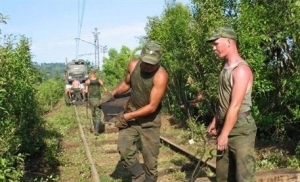Georgian Silence as Russia-Abkhazia Railway is Restored
Parallel to the devaluation of the national currency, the government has a new headache. Russia started restoring the railway near the occupation line in the occupied Abkhazia. According to the deputy defense minister of the Russian Federation Dmitry Bulgakov, railway works are underway on 33 kilometers of track from Sokhumi up to the Enguri River. According toBulgakov’s information, 9 kilometers are already completed. After this statement of Bulgakov, the entire Georgian political elite is searching for answers to the following questions: why is the Kremlin emptying an already empty pocket and, most importantly, why was the Georgian government hiding this information for almost a month?
The Kremlin’s interest in restoring the railway infrastructure in the South Caucasus is not new. Back in 2013, at the dawn of the Georgian Dream government, the then Prime Minister Bidzina Ivanishvili told a Radio Liberty journalist in Yerevan that it would be possible to restore the railway: “It is possible to restore the railway but of the hindering factors the main are big problems between Russia and Georgia and the problem of territorial integrity. This problem will probably not be solved very quickly but the railway issue can be solved sooner if there is will from all sides,” Ivanishvili said. President Putin responded to this statement of Ivanishvili and expressed readiness to support the restoration of the Sokhumi-Tbilisi-Yerevan railway route. “We believe that with other partners it is possible to think and in case of common agreement implement projects such as transit railway transportation to the directions of Sokhumi and Tbilisi and then to Yerevan and to Russia. Implementation of such a project will create conditions for the development of cooperation among all interested parties in the region,” he said. President Putin made the decision after signing the cooperation document with the de-facto president of occupied Abkhazia Raul Khajimba. The issue of the railway on the agenda of the Georgian Dream did not end there. When the government presented the list of sites for privatization, the Minister of Economy said with regret that the Georgian Railway was not on the list. “It would be good to put 25% of the Georgian Railway for privatization. It would largely increase the income from privatization. However, at the same time we should treat the issue carefully and approach possible owners of the railway shares selectively,” Giorgi Kvirikashvili said without specifying the names of possible owners.
Concerns of analysts followed these statements about the railway on why the government was hiding its restoration for almost one month. Of the many versions of possible reasons covered by the media, the main opinion was that Russia has either already convinced the Georgian government to open the Abkhazian railway or hopes to convince them in the near future. It is noteworthy that statements on the possible opening of the railway in Abkhazia on the Russian side were made by the deputy Foreign Minister Gregory Karasin during negotiations for the purposes of discussion but the Georgian side was not amenable. A recent topic at the Karasin-Abashidze negotiations was activation of the Georgia-Russia agreement signed in 2011, which considered putting Swiss customs officers on the Georgia-Russia border (at thePsou River). It is not ruled out that Russia will attempt to link the restoration of the railway in Abkhazia with this agreement. Interestingly, in the polemics in the press, the government reacted with enthusiasm, starting with the Defense Minister and finishing with the Probation Minister, everyone tried to guess what Russia had in mind but no minister managed to give answers to the main question – why was the government hiding the railway restoration?
The most interesting aspect in this railway saga is that information has spread already that Azerbaijan has already transferred money to the Swiss company Stadler Rail Group to buy 30 passenger carriages of international standards. These carriages will move on the Baku-Tbilisi-Kars railway, which according to vesti.az, should be launched at the beginning of next year, i.e. in a few months, after the Russian railway troops finish railway works in the occupied Abkhazia in December. Therefore, it is easy to guess why the Kremlin is trying to restore the railway and what alternative it is offering to Tbilisi.
Zaza Jgharkava












